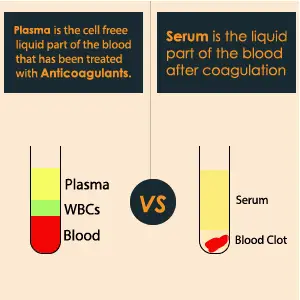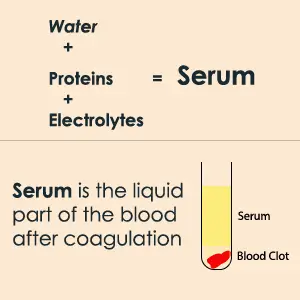
Plasma VS Serum Differences and Comparison Guide.
The difference between plasma and serum is that is that Plasma has clotting factors in it while Serum does not contain clotting factors. Clotting factors are those factors that leads our blood to clot. Also, serum and plasma are present within the blood stream.
Looking interesting?
I guess You said Yes. Come go more in-depth.

What is Blood
Blood is a fluid in our body of red color possessing RBCs, WBCs, platelets, water, plasma, nutrients and serum in it.
Do You think that blood is always red?
NO.
It can have many colors as octopus have blue blood in it while a cockroach have white blood stream in it.
interesting right?
The nutrients from the food You eat goes to the blood after digestion. The blood then transports all those nutrients to all the parts of the body. There is a blood manufacturing machine in Our bodies and that is bones. Bones contain bone marrow which produces blood in our bodies.
Difference Between Plasma and Serum
| Plasma | Serum | |
| 1. |
It contains the clotting factor and it is the yellow-clear liquid part existing in the blood.
|
It does not contain clotting factors and it is the liquid part existing in the blood post-coagulation. |
| 2. | Anticoagulants are required for its separation from the blood like citrate, heparin, EDTA | Anticoagulants are not required for its separation from the blood. |
| 3. | It is less time consuming and it can be acquired by spinning the blood before it gets clot. | We can get it by spinning the after clotting and is a time taking procedure than getting plasma. |
| 4. | It includes more of the total volume of the blood; 55% of the total blood volume contains plasma. | It is found always lesser in the volume than plasma. |
| 5. | It contains fibrinogen. | It does not contain fibrinogen. |
| 6. | It is the diluted, transparent, straw-colored liquid portion of the blood. | It is undiluted liquid portion of the blood that is extracellular. |
| 7. | There is only 8% stock plasma in the whole plasma solution, rest 92% is the water. | It contains 90% of water and rest is the serum mixed with proteins, hormones, minerals and carbon dioxide. |
| 8. | It possesses a density of 1.025 g/mol | It possesses a density of 1.024 g/mol |
| 9. | It can be preserved for about ten years which means it has a longer preservation period | It has a lesser shelf life than plasma to only a few months. |
| 10. | It contains freely moving cells. | It possesses cells making network by formation of clot. |
| 11. | We could isolate it by taking in consideration the process of spinning right before clotting. | We could isolate it by taking in consideration the process of spinning right after clotting. |
| 12. | It is considered the main medium for excretory product transportation. | It can be considered an important source of electrolytes. |
| 13. | It is used for diagnosing severe liver diseases and trauma in patients in which plasma transfusion is done. | It can be used for laboratory techniques including hormone & enzyme tests.
|
| 14. | It is an inexpensive process to isolate. | To isolate serum, it is a costly process |
Similarities between Serum and Plasma:
As there are differences, there are similarities between Serum and Plasma that also exist. The generic commonalities between them are that they both are liquids and are components of the blood and are working together side-by-side in the bloodstream. Both of them can be separated by centrifugation.
Following is the checklist of similarities in them:
Commonalities |
|
|
|
|
|
|
|
|
What is Plasma
Plasma a blood ingredient that covers about 55% volume from the total blood volume. Plasma solution alone includes only 8-10% of pure plasma while rest is the water, with water there is also fibrinogen present.
Antibodies, hormones, nutrients including macro and micro, all are transported to the rest of the body tissues by the plasma.
Plasma is also a waste product carrier as it wanders in the body, the cells secrets their wastes into the plasma to be excreted out.
What is meant by serum and serum composition
For those who don’t know what is meant by serum and serum composition. It is a component of blood as a solute. It does not have a clotting factor as fibrinogen. It can also be pronounced as plasma without fibrinogen. It is composed of water, antigens, antibodies, electrolytes, and hormones.

When to use plasma/serum or both
To use both is a good practice whether we are taking in consideration the cell culture, research essay, or diagnostic test. Makin use of both can lead us to more precise results while to false often if we use only one of them. Separate results but more close
Why is serum preferred over plasma
Actually, we cannot say confidentially that serum is preferred over plasma. These are two different things and are used for different purposes. In general serum samples are preferred over plasma because chemistry research references are based on serum and not on plasma yet.
There are some points that technicians take both in consideration to analyze results that come out by using both to compare and make a more precise final result.
Conclusion:
We can conclude that both plasma and serum are different ingredients of the blood and possess their own importance in the blood and clinical techniques. Both are important from the three extremely important components of the blood (serum, plasma, and BCs)
FAQ
What is fibrinogen?
Fibrinogen is a blood component that is complex made of glycoprotein. It is manufacture in the liver. During the injury, it is transformed enzymatically to fibrin by thrombin and ultimately to a blood clot that is fibrin based. Fibrin is present in plasma while absent in serum.
What is meant by coagulation?
The process by which any liquid get clotted is called as coagulation.
What is the clotting factor?
The clotting factor is a collection of proteins that exist in the blood and get activated at the time of injury and make the blood thick to ultimately a clot and prevent from excessive bleeding.
What are antibodies?
Antibodies are a specialized form of cells in the blood that fight against the pathogens entered from outside the body.
What are antigens?
Antigens are toxic or pathogenic molecules that enters from outside the body and may be harmful for the immune system of the body.